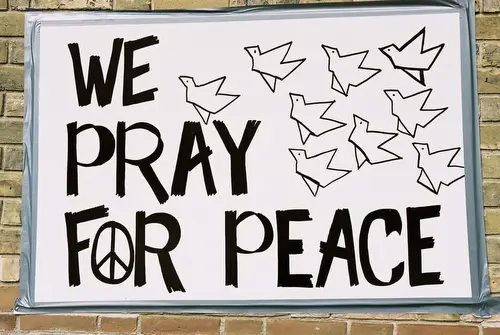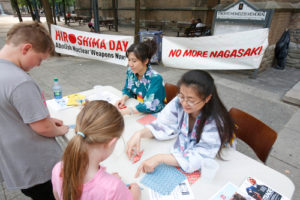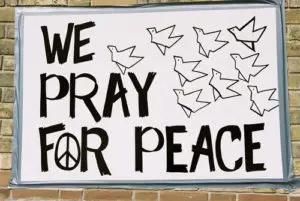
By the Rev. Tyler Wigg-Stevenson
Anglicans in Canada may be surprised to learn that they are, by extension, winners of the 2017 Nobel Peace Prize.
This October, the Nobel committee announced that the 2017 Peace Prize had been awarded to the International Campaign to Abolish Nuclear Weapons (ICAN), a Geneva-based international coalition of which the Anglican Church of Canada is a member. The prize was awarded for ICAN’s work as the driving force behind the groundbreaking Treaty On The Prohibition Of Nuclear Weapons, which was negotiated at the United Nations earlier this year, approved by 122 nations in July, and opened for signature in September.

Known informally as the Nuclear Ban Treaty, it prohibits the development, testing, production, possession, and use or threat of use of nuclear weapons. It also prohibits non-nuclear nations from relying on nuclear-based security guarantees of other countries – such as the “extended deterrence” that the United States has historically offered to allies like Japan and South Korea. When 50 nations ratify the ban, it will enter into force permanently.
The Ban Treaty was not won without controversy. The world’s nuclear powers vocally boycotted the treaty negotiations, and encouraged and coerced their allies to do the same. Canada was notably absent from the negotiations. During Question Period in Parliament, Prime Minister Justin Trudeau defended Canada’s boycott by saying that the absence of nuclear-armed states from the discussions made negotiations “sort of useless.” The Trudeau government even declined to congratulate Canadian Setsuko Thurlow – a survivor of the Hiroshima atomic bomb and an anti-nuclear activist – when it was announced that she would jointly accept the Nobel Prize with Beatrice Fihn, ICAN’s executive director, at the award ceremony on Dec. 10.
Supporters of the ban, however, see the opposition of politicians like Mr. Trudeau and President Donald Trump as an indication that they are doing something right. During a key session in the treaty’s development at the UN, US ambassador Nikki Haley held a press conference outside the chamber, declaring that the Ban Treaty would accomplish nothing. According to Ms. Fihn, however, Ambassador Haley’s actions belied her words. It was, Ms. Fihn said, like a neon arrow sign saying “progress happening here.”
From the perspective of Canadian history, the Trudeau government’s dismissal of the ban appears indefensible. Canada’s historic commitment to peace and disarmament is perhaps most notably enshrined in this nation’s leadership to ban antipersonnel landmines in the 1997 Ottawa Treaty. That treaty was boycotted and opposed by landmine possessors, and entered into force despite their opposition and non-participation. But the treaty’s articulation of a global norm against landmines has proven consequential even for those countries that still refuse to ratify it, resulting in a radical decline in the use of landmines worldwide.
The Ottawa Treaty example might explain the Trudeau-Trump fear of the nuclear ban. The ban is based on the recognition that nuclear weapons result in unacceptable humanitarian consequences. These range from uncontrollable local fallout in a limited use of nuclear weapons, to global famine resulting from regional nuclear war, to the omnicidal extinction of a nuclear exchange between superpowers.
The ban also recognizes the horrific humanitarian consequences of the simple existence of nuclear weapons. The development, testing, and possession of nuclear weapons has had a well-documented but underreported effect on women and children and the reproductive cycle, and disproportionately affected Indigenous populations.
 Thus, by naming nuclear weapons as an existing humanitarian crisis, which threatens to become exponentially worse in the event of their use, the ban reveals the inherent injustice behind a security policy that relies on such weapons.
Thus, by naming nuclear weapons as an existing humanitarian crisis, which threatens to become exponentially worse in the event of their use, the ban reveals the inherent injustice behind a security policy that relies on such weapons.
This injustice also speaks to the alignment of Christian theological and ethical priorities with the ban treaty. Christians have been among the most vocal opponents of nuclear weapons since their development and use at the end of World War II. In Canada, the Anglican Church has a long history of resolutions opposing nuclear weapons and supporting disarmament, including the 2007 General Synod resolution that led to the ACC joining ICAN. At a global level, the Holy See was one of the first nations to sign and ratify the ban, and there is little daylight between the Vatican’s anti-nuclear position and that of the World Council of Churches and the World Evangelical Alliance, the other two world bodies representing Christianity.
This unity of Christian opposition to nuclear weapons is perhaps most fundamentally grounded in the Just War tradition, a theological framework for considering armed conflict that has historically guided Anglicans and Roman Catholics, among others. In brief, Just War forbids the use of weapons that do not discriminate between combatants and non-combatants, as well as violent force that causes more harm than the good it seeks to do. As a category, nuclear weapons fail both these tests, making them a de facto instance of weapons forbidden as mala in se (evil in themselves), like mass rape, torture, and genocide.
During the Cold War, the recognition of nuclear weapons’ evil was functionally outweighed, even for many Christians, by the conviction that only nuclear deterrence could prevent their use. Today, however, the spiraling crisis of world events reveals the alignment of moral virtue and prudential wisdom undergirding the ban treaty. Seventy-two years after Hiroshima and Nagasaki, we are leaving behind the era when one could imagine that we had to have nuclear weapons so that they would never be used. Now, we are entering a new, uncharted era, in which the increasing consensus of security experts is that the indefinite existence of nuclear weapons guarantees their eventual use. The crisis unfolding on the Korean Peninsula is just one instance of the danger we face.
Such crises confront us with our own powerlessness. They also invite us to what we can do, which is repentance and the refusal of complicity.
Toward this end, perhaps the Anglican Church in Canada will seek to live up to our imputed Nobel Prize: first, by forming an army of prayer that God will give us “time for amendment of life,” as the Compline blessing puts it. And, second, as an army of activism, insisting both as dioceses and faithful individuals that our government have the courage to name right from wrong by signing the ban treaty – and then doing the hard work of adjusting its security policies accordingly.
The Rev. Tyler Wigg-Stevenson is the assistant pastor at Trinity East (Little Trinity Church), Toronto. He also chairs the World Evangelical Alliance task force on nuclear weapons.
Here are some suggested resources for marking the award of the 2017 Nobel Peace Prize to the International Campaign to Abolish Nuclear Weapons (ICAN), of which the Anglican Church of Canada is a member, on the second Sunday of Advent, Dec. 10, 2017:
Bulletin insert:
At the very hour that North American Christians gather for Sunday morning worship today, the 2017 Nobel Peace Prize is being awarded to representatives of the International Campaign to Abolish Nuclear Weapons (ICAN), an international coalition of which the Anglican Church of Canada is a member. How fitting that Peace is the traditional theme for the second Sunday of Advent! As we light the Advent candle in expectation of Jesus Christ, our Prince of Peace, we pray that God would grant us grace to repent of weapons that make idols of our own strength, and give courage and moral clarity to our political leaders, that they might move decisively for the abolition of nuclear weapons.
Prayers for lighting the Advent Candle or Prayers of the People:
Almighty God, we pray for your grace and favour on all those who work for peace in ways both great and small, especially the leaders of the International Campaign to Abolish Nuclear Weapons, who today receive the 2017 Nobel Peace Prize. Restrain the forces of war everywhere, O God of the nations, especially in Yemen, the Korean peninsula, and […]. Grant us and all those in authority the courage to repent of weapons that make idols of our own strength, and of all vain hopes for salvation. For you alone are our help and our shield; you make our hearts glad, as we trust in your holy name (Ps 33). We ask this in the name of the one whose blood on the cross is the advent of a peace that will never end, your Son, Jesus Christ, who lives and reigns with you and the Holy Spirit, now and forever. Amen.